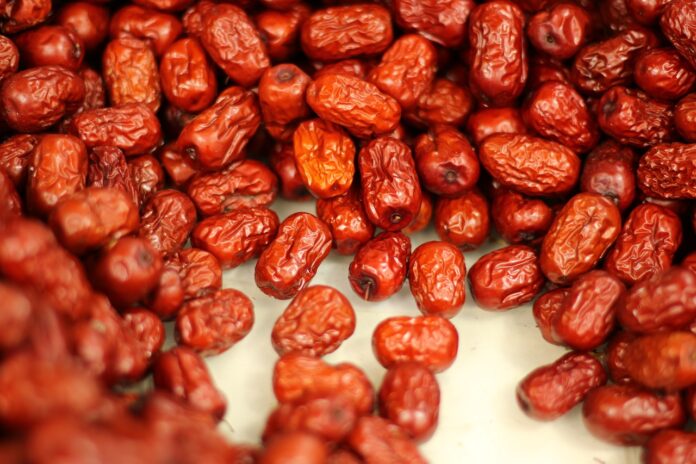Jujube, often called the “Chinese date,” is a small, sweet, and versatile fruit known for its chewy texture and nutritional benefits. Originating in Southern Asia, jujube has been cultivated for over 4,000 years and plays a crucial role in traditional medicine and cultural practices throughout the region. The fruit starts off green and transitions to a reddish-brown color as it ripens, developing a flavor profile that ranges from mildly tart to honey-sweet.
Interesting Facts About Jujube Fruit:
- Largest Jujube Fruit: In 2017, China cultivated the world’s largest jujube, weighing an impressive 3 pounds. This record-breaking fruit was celebrated at a festival dedicated to showcasing exceptional agricultural produce.
- Oldest Jujube Tree: The oldest jujube tree in China, located in the Shandong province, is estimated to be over 1,300 years old. This ancient tree continues to bear fruit, showcasing the longevity and resilience of the species.
- High-Yield Production: China holds the title for the highest jujube production globally, with an annual yield that exceeds 8 million tons. The fruit is primarily grown in regions like Xinjiang and Hebei, known for their ideal climate conditions.
- Transport Accidents: Due to the fragile nature of the fruit, jujube transportation is prone to accidents. In 2020, a major highway accident in Pakistan led to the loss of thousands of crates of fresh jujubes, impacting local markets significantly.
- Drought Impacts: Severe droughts in areas like the Xinjiang region have caused widespread damage to jujube orchards, leading to financial losses for farmers. In 2016, a drought led to the loss of over 30% of the crop yield, sparking concerns about sustainable water management for jujube farming.
- Ancient Medicinal Use: Jujube fruit has been mentioned in classic texts like “Shennong Ben Cao Jing,” a foundational Chinese pharmacopoeia, where it was praised for its wide range of health benefits. In Ayurvedic medicine, jujube extracts are also used for their healing properties
- Nutritional Powerhouse: One serving of jujube fruit contains nearly 77% of the daily recommended intake of vitamin C, which aids in collagen production, enhances iron absorption, and promotes healthy skin. Additionally, jujube contains 18 of the 24 essential amino acids, contributing to tissue repair and muscle health
- Promotes Sleep: The calming effects of jujube come from compounds like saponins and flavonoids, which interact with neurotransmitters like serotonin and melatonin to promote relaxation and reduce anxiety. Jujube seeds, in particular, are used in herbal remedies to improve sleep quality
- Culinary Uses: Besides being eaten fresh, jujube is a versatile ingredient in cuisines worldwide. In the Middle East, it is used in savory dishes and stews, while in China, dried jujube is a staple ingredient in soups and congee
- Sweetness Variation: As the fruit ripens and dries, its sugar content increases, making it a popular substitute for dates in recipes. It caramelizes well, making it ideal for syrups, sauces, and energy bars
- Versatile Drinks: Jujube wine is a unique alcoholic beverage produced by fermenting the fruit, which adds a sweet and tangy flavor profile. Jujube tea, made from dried or candied jujubes, is consumed for its soothing and digestive benefits
- Stress Relief: Studies suggest that jujube’s adaptogenic qualities may help regulate hormones like cortisol, which play a significant role in stress response. This effect makes the fruit beneficial for individuals with high-stress lifestyles or conditions like adrenal fatigue
- Low-Calorie Fruit: With only about 79 calories per 100 grams, jujube is a guilt-free snack. Its low calorie and high fiber content make it a preferred choice for those looking to maintain a healthy weight
- Historical Mentions: Ancient Chinese poets and philosophers often used jujube as a metaphor for resilience and vitality. The fruit is mentioned in “Classic of Mountains and Seas,” an ancient collection of Chinese mythology
- Tonic Herb: Jujube is often combined with ginseng and astragalus in traditional tonics to strengthen the body’s defense mechanisms. These concoctions are believed to rejuvenate the body, improve energy, and restore balance
- Diverse Varieties: The “Li” and “Lang” varieties are the most commonly cultivated in the United States, while other regions have unique strains like “Honey Jar,” prized for its sweetness. Each variety offers distinct flavors and textures
- Candied Jujube: Making candied jujube involves simmering the fruit in sugar syrup, which preserves it and intensifies its flavor. In Chinese New Year celebrations, candied jujubes are enjoyed as part of the traditional sweets platter
- Hardwood Use: The wood of the jujube tree is strong and resistant to decay, making it ideal for making high-quality furniture, durable tools, and even musical instruments like flutes and zithers in some cultures
